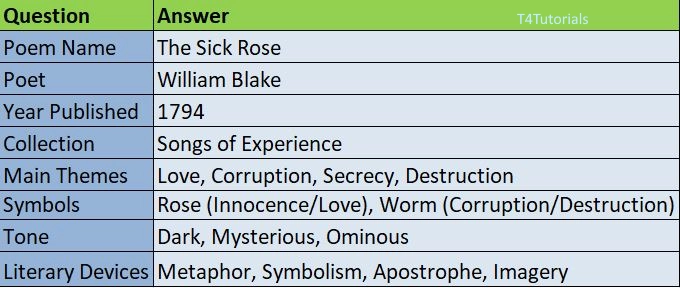Summary:
William Blake’s The Sick Rose is a short yet deeply symbolic poem from Songs of Experience (1794). The poem presents a dark and mysterious vision of love, corruption, and destruction.- The poem describes a rose that has been infected by an invisible worm, which flies in the night and destroys it secretly.
- The rose symbolizes beauty, innocence, or love, while the worm represents corruption, disease, or betrayal.
- The darkness and stormy night create a sense of secrecy, sin, or hidden destruction.
- The poem suggests that love can be ruined by secrecy, manipulation, or negative influences.
- A literal interpretation: A flower being destroyed by a worm.
- A symbolic reading: Love being corrupted by secrecy or sin.
- A social reading: The innocence of society (or women) being destroyed by hidden forces.

10
Score: 0
Attempted: 0/10
Subscribe
| Question | Answer |
| Poem Name | The Sick Rose |
| Poet | William Blake |
| Year Published | 1794 |
| Collection | Songs of Experience |
| Main Themes | Love, Corruption, Secrecy, Destruction |
| Symbols | Rose (Innocence/Love), Worm (Corruption/Destruction) |
| Tone | Dark, Mysterious, Ominous |
| Literary Devices | Metaphor, Symbolism, Apostrophe, Imagery |